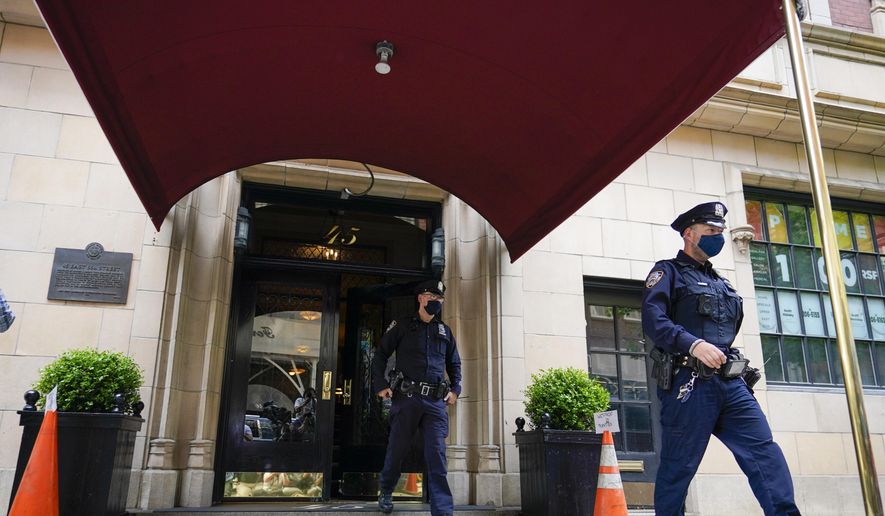Federal investigators on Wednesday raided former New York City Mayor Rudolph W. Giuliani’s home and office as part of an ongoing investigation into his dealings in Ukraine.
They descended on the properties after obtaining a search warrant as part of an ongoing probe into his business deals and purported role in the recall of Marie Yovanovitch, the U.S. ambassador to Ukraine who was abruptly removed from her post in early 2019.
Investigators are said to be reviewing whether Mr. Giuliani violated foreign lobbying laws while working as an attorney for former President Donald Trump.
Mr. Giuliani, in a statement through his attorney, slammed the move. He said the Justice Department was “running roughshod over the constitutional rights of anyone involved in, or legally defending, former President Donald J. Trump.”
He also accused federal authorities of operating under a “corrupt double standard.”
Mr. Giuliani’s son, Andrew, called the situation “absurd” and “disgusting.”
“Our Justice Department should be independent of politics,” he said in Manhattan. ”If this could happen to the former president’s lawyer, this could happen to any American.”
Reports of an investigation into Mr. Giuliani broke last year after two of his associates, Lev Parnas and Igor Fruman, were arrested on suspicion of trying to funnel foreign money to a pro-Trump super PAC.
Prosecutors have also accused the pair of using the funds to influence relations between the U.S. and Ukraine. As part of that probe, prosecutors began examining Mr. Giuliani’s ties to the two men.
Mr. Giuliani has acknowledged that he sought dirt on Mr. Trump’s political opponents’ activities in Ukraine. His targets included President Biden, his son Hunter, and Ms. Yovanovitch. He also spoke with a top Ukrainian prosecutor.
Under the Foreign Agents Registration Act, U.S. citizens must notify the Justice Department of contacts they have with foreign government or officials.
Investigators seized electronic devices in the raid, according to The New York Times. The paper also reported that agents raided the Washington-area home of Victoria Toensing, a lawyer and Giuliani associate.
The FBI and U.S. Attorney’s Office in Manhattan did not respond to requests for comment.
The raid shook Washington and the legal world. Some said it smelled bad, given Mr. Giuliani’s proximity to Mr. Trump and criticism of the current president’s son.
“This looks like prosecutorial harassment of a political opponent,” said Ford O’Connell, a GOP strategist. “It seems to me the Biden administration is punishing Trump supporters.”
And Mr. Giuliani, he said, is “Trump supporter No. 1. That should raise a lot of eyebrows.”
Mr. Giuliani rose to fame as a crusading U.S. attorney who took on the mafia in New York before his response to the attacks on Sept. 11, 2001, earned him the nickname “America’s mayor.”
He became an increasingly polarizing figure during his period as Mr. Trump’s personal lawyer and a punchline when hair dye streaked down his face at a press conference on alleged fraud in the 2020 election.
“This is quite a turnaround, you’ve got somebody who was running the Southern District of New York who is now being targeted by the Southern District of New York,” Mr. O’Connell said.
Darrell West, director of governance studies at the Brookings Institution, said it is “unprecedented to raid the home and seize the electronic devices of a president’s lawyer.”
“The public will be skeptical on political grounds, but the fact prosecutors did this suggests they have good reasons to do this,” he said. “You generally need other compelling evidence to undertake an operation like that.”
Ross Baker, a politics professor at Rutgers University, said “tit-for-tat politics is in its fullest flowering,” so he expects to see grumbles about the lack of door-busting on the left.
“The raid on Giuliani’s home and office is certainly going to set up a cry for forced entry into Hunter Biden’s laptop and an investigation into Hillary’s emails to Anthony Weiner or George Soros,” he said.
Prosecutors will need to establish an agreement or compensation, or even delayed compensation, to make a credible case if the investigation hinges on claims Mr. Giuliani lobbied for Ukrainians, according to Jonathan Turley, a law professor at George Washington University.
“However, seizure of electronic records can also lead to other ‘discovered’ crimes,” Mr. Turley wrote in a Twitter thread.
He said the maximum penalty of FARA violation is not more than $250,000 or by imprisonment for not more than five years, though most violations are treated as civil matters or “subject to far lower sanctions.”
• Tom Howell Jr. can be reached at thowell@washingtontimes.com.
• Jeff Mordock can be reached at jmordock@washingtontimes.com.




Please read our comment policy before commenting.